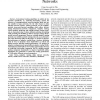2331 search results - page 304 / 467 » On Optimal Performance in Mobile Ad hoc Networks |
SIGCOMM
2004
ACM
15 years 3 months ago
2004
ACM
Routing protocols for wireless ad hoc networks have traditionally focused on finding paths with minimum hop count. However, such paths can include slow or lossy links, leading to...
PERCOM
2009
ACM
15 years 5 months ago
2009
ACM
—Ensuring spontaneous ad hoc interoperation in decentralized ubiquitous computing environments is challenging, because of heterogeneous resources and divergent policies. Centrali...
IWSOS
2009
Springer
15 years 4 months ago
2009
Springer
Abstract. In this paper, we describe an approach to activity recognition, which is based on a self-organizing, ad hoc network of body-worn sensors. It makes best use of the availab...
IEEEARES
2008
IEEE
15 years 4 months ago
2008
IEEE
Mobile Ad hoc Networks (MANETs) rely on dynamic configuration decisions to efficiently operate in a rapidly changing environment of limited resources. The ability of a MANET to ma...
112
Voted
ICC
2009
IEEE
14 years 8 months ago
2009
IEEE
Conventional routing algorithms in mobile ad hoc networks (MANETs), i.e., multi-hop forwarding, assume the existence of contemporaneous source-destination paths and are not scalabl...

